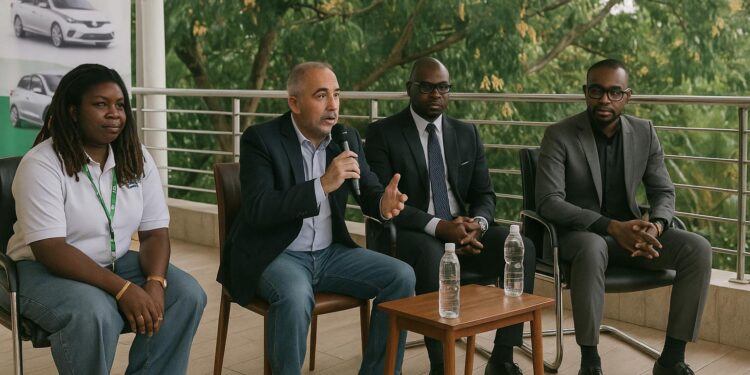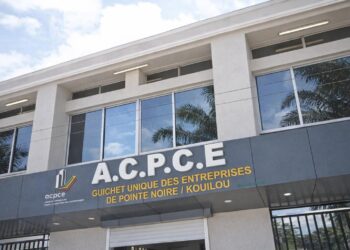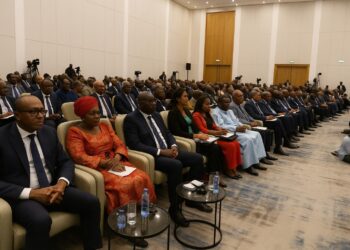Francophone expansion gathers pace
Gozem, the West-African Super App backed by investors such as AAIC and Plug and Play, will officially begin operations in Brazzaville on 5 November, marking its first step in the Republic of Congo and the latest milestone in its francophone expansion strategy.
The company already runs fleets in Lomé, Cotonou, Libreville and Douala, with more than 7,000 two-wheelers, tricycles and taxis connected to its cloud platform, according to co-founder Raphaël Dana during a pre-launch briefing in the Congolese capital.
Policy context and regulatory fit
Brazzaville’s market, still dominated by informal green-and-white taxis, is considered attractive because recent municipal guidelines encourage digital dispatching, data-driven route optimisation and cashless payments, objectives that align closely with Gozem’s compliance toolkit and ongoing dialogue with the Ministry of Transport.
Executives underline that the platform will complement rather than displace existing operators, offering registration, geolocation and insurance services that can help authorities formalise the sector while preserving livelihoods, an argument that has already eased licensing talks in Togo and Gabon.
Fleet composition and service mix
Gozem will enter Brazzaville with an initial fleet of 1,700 registered vehicles and plans to cross the 2,000 mark within months by onboarding additional saloon taxis and moto-tricycles currently operating on the city’s northern corridors.
At launch, users will be able to choose between four products labelled Taxi, Delivery, Shopping and Wallet, each accessible through a lightweight Android app designed to function reliably on 3G networks and modest data bundles typical across Central African markets.
The company emphasises ride-safety features such as SOS buttons, driver background checks and GPS trip sharing, elements that have helped it reach an average 4.8-star rating on regional app stores and secure underwriting partnerships with Sanlam and other insurers.
Driver economics and social impact
Registered drivers, known internally as Champions, receive free smartphone training, discounted fuel through bulk agreements and optional health cover, benefits that management says can lift monthly net earnings by up to 30 % compared with traditional street-hail operations.
For passengers, digital booking reduces wait times during peak traffic and provides fare transparency; the app calculates distance-based tariffs aligned with municipal guides, allowing commuters to compare before confirming, a feature praised by consumer associations during pilot demos.
Cashless rails and financial inclusion
Beyond mobility, Gozem is courting local banks, microfinance institutions and mobile money operators to integrate flexible wallets that convert ride revenue into savings or credit scores, opening the door to vehicle financing products tailored for independent drivers.
Epiphane Goka, city manager for Brazzaville, notes that only 26 % of adults currently hold a formal bank account; embedding payments within a daily-use service could accelerate the national strategy for financial inclusion endorsed by the Ministry of Economy.
Initial promotions include a welcome discount of 50 % on the first two trips and a referral programme rewarding both driver and passenger wallets, tactics tested in Lomé where customer acquisition costs reportedly fell below three US dollars after six weeks.
Growth prospects inside Congo
Management is already mapping traffic flows in Pointe-Noire and Dolisie, envisaging a hub-and-spoke model where regional clusters of 500 vehicles each feed a central dispatch algorithm hosted on AWS’s Cape Town data centre, thus meeting data-sovereignty guidance issued by the Congolese ICT regulator.
Dana argues that profitability at city level can be achieved once daily utilisation reaches eight trips per vehicle, a threshold that Douala and Cotonou fleets cleared within nine months; Brazzaville’s higher population density provides a favourable backdrop, albeit with more complex congestion patterns.
Key performance indicators to monitor
Investors will watch gross transaction value, rider retention after the promotional window, on-time pickup rate and non-cash share of payments, metrics the company intends to publish quarterly on its website to bolster transparency for prospective regional lenders.
Environmental attributes will also be scrutinised; Gozem plans to pilot electric two-wheelers imported from India, leveraging Congo’s comparatively low-carbon electricity mix to reduce per-kilometre emissions and position itself for emerging carbon credit schemes across the Central African sub-region.
If execution matches projections, Brazzaville could serve as a reference case for technology-driven urban mobility models in Central Africa, illustrating how regulatory collaboration, data analytics and targeted incentives can expand transport capacity while supporting government priorities of digital transformation and inclusive growth.
FAQ for strategic stakeholders
How will fares be set? Management confirms an algorithm that adjusts for distance, time and fuel price caps issued by prefectural decree, with a minimum floor aligning to the existing taxi flag-down rate so that incumbents are not undercut.
What about data privacy? Gozem stores personally identifiable information in encrypted form and adheres to Congo’s 2019 Data Protection Act; audit access is granted to the regulatory authority, according to operations lead Manfreed Tomegah.












































